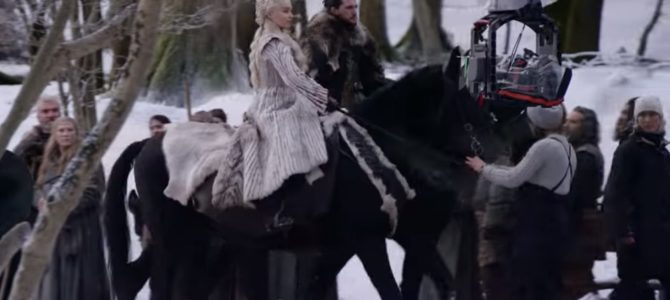
As we head into the final season of “Game of Thrones,” I considered which conflict sequences were the most strategically sound and realistic. Needless to mention, one can only suspend disbelief so much, as for all its gritty realism the series contains zombies and dragons.
Nevertheless, after much thought, I came down to my top three in order of realism: Hardhome, Beyond the Wall, and Battle of Blackwater Bay. Now, for those of you who have not read the books or watched the series, this might be a bit too technical and hard to follow, but I’ll try and explain as I go.
“Game of Thrones” is a series about a conflict and civil war between five rival kingdoms in a mass of land that unsurprisingly looks very much like England. The storyline is broadly inspired by the English War of the Roses, with the Northerners mainly battling the Southern lords, and the “wildlings” beyond the walls (sorry, Scots!) trying to influence the politics in the heartland.
There were other battles and wars in the books and in the series that deserve mention, but this is not about that. How realistic are the politics, international relations, and war strategy in the “Game of Thrones,” and how does our daily life reflect in the fantasy series? “Game of Thrones” actually does reflect a lot of our daily politics.
Daenerys Targaryen, the Humanitarian Interventionist
Let’s start with our protagonist and prospective winner of the Iron Throne, Daenerys Targaryen. Daenerys Targaryen’s journey is deeply familiar, from a gullible idealistic liberal-humanitarian interventionist to an overstretched imperial hegemon. With no reverence for existing institutions of social structure, history, or culture, across her conquered lands Dany tried to shape a society and build a nation, facing failure every single time before cutting losses and moving to a new adventure.
Dany’s story arc so far demonstrates something we have also observed in international relations: it’s easy to invade a region and try to establish a rule of law, if one carries enough firepower, and it might even be successful if the conquered region broadly shares a similar culture to the conqueror’s. But winning wars is different than transforming an alien society, and kindness and norms mean only so much, if you don’t have the requisite brutality to impose order.
That’s because, in every society where the existing structure is overthrown, there’s always an insurgency, and counterinsurgency is never won by winning hearts and minds. What ancient Romans and the former British Empire understood, and what Daenerys Stormborn and our current policymakers fail to understand post-1945, is a lesson we have refused to remember. Carthage needed to be destroyed and its ground salted, and clients and satellites established to impose order through force. It might not sound right in 2019, but it is the only way to end a counterinsurgency.
Mercifully, Dany seemed to have learned the lesson of deterrence with her bomb run against the advanced Tarly and Lannister forces, and her swift, brutal justice by burning them alive. While the end is yet to be seen, one can argue that her establishing deterrence was influential in bringing every warring party to the negotiation table.
The Starks’ Lack of Discipline and Unity
Dany’s idealism can only be topped by the House of Starks, our naïve and strategically inept northern lords. Catelyn Stark, the matriarch of the utterly imbecile family, started the whole conflict when she arrested the rival family’s second son on a whim, just to demonstrate power. It would take a whole essay just to show how myopic the Starks are, but to name a few, Catelyn (again) let go of the biggest bargaining chip she had, one Jaime Lannister, after arresting him first, again on a whim.
Her husband, the honorable Ned, got some explosive information about the infidelity and incest of his powerful rival, and then without any backup force instantly gabbed about that to the same person on whom he had dirt, and proceeded to lose his head. Their son, instead of marrying a woman who could have solidified an alliance and won a war, went for another woman, and got murdered and his family wiped out.
This has been a Machiavellian paradox in the entire series. Robert Baratheon, the original king and a drunken louche, realized something important despite his debauchery, that a society needs a sense of discipline and unity to survive. Any society without a common purpose or identity, and with too much individualism and freedom and differing interests, eventually disintegrates.
The paradox is in the balancing act. Fear didn’t help Robert hold on, as he did not have the requisite discipline. Honor and values, on the other hand, did not help his best friend Ned Stark keep his head either. Most importantly, values and ethics are meaningless for realpolitik, and hard power remains the most important variable.
This fundamental principle has been repeated throughout. The Brotherhood without Banners, a fancy, hipsterish rebel group, needed to finally join the Nights Watch. Tyrion Lannister, one of the most intelligent characters, had to find a hegemon to rely on and enforce his policies. Lord Littlefinger Baelish, on the other hand, followed his isolationism to his gory end.
The trajectory of Cersei Lannister increasingly looks the same. None of these people are without qualities. Some are honorable, some roguish, some intelligent and ethical, some crafty and cynical. But all of them suffer from a notable disadvantage of being extreme: extremely honorable, extremely selfish, extremely stubborn, extremely confident in personal capability and not the forces of nature or adversaries.
The lack of balance in an individual or a power leads to miscalculation and hubris. And hubris is always followed by nemesis. This is perhaps the one constant lesson for all characters of “Game of Thrones,” from the Starks to the Lannisters, to the Greyjoys and the Targaryens: Icarus always burns his wings while flying too close to the sun.
Jon Snow’s Slow But Steady Learning Curve
Ultimately, therefore, the most formidable character development is Jon Snow’s. Jon wasn’t my favorite. When I started watching the show, I was a Littlefinger fan. But I became most personally invested in his arc in the last decade or so.
Jon is essentially just another man. Born of nobility, with aristocratic blood, but without the privilege that comes with it, he had to learn his life lessons completely on his own, and choose his own path without any patronage or pedigree. Bereft of patronage, his conservative sense of personal responsibility, individual heroism, and detached stoicism makes him a fallible, but better man than his contemporaries.
Like every man of the hour, Jon doesn’t seek power for power’s sake, or desire to be at the center of the drama. In fact, his character possesses a distinct fallibility because he is a human and he trusted people who betrayed him. But he is prudent enough to bestow a swift justice to all those who were not worthy of his trust, including the people he cared for, because he’s conservative enough to understand choices must have consequences.
Skeptical of power, melancholic about fate, but gloomily cognizant of his burden of leadership to the point where he sacrifices his love in favor of duty, Jon is an archetypal flawed realist, and a literary reflection of the virtues of a man worshipped from Plato to Byron, Diogenes to Tolkien.
Sansa Stark’s character arc is similar. Hopelessly romantic to start, she also went through a brutal adversarial fate to finally take her revenge and earn her rightful position. For a story based on medieval social values, Sansa remains the most powerful female character, and it was only fitting that Jon owes his life to Sansa’s strategic acumen, planning, and foresight.
“Game of Thrones” is a fantasy, of course. It is futile to find much meaning in it, and one can only imagine how it might end. But a timeless work of literature reflects life’s eternal virtues to a certain degree, and nothing is more timeless than conservative prudence and realism, a sense of responsibility, and a spot of masculine stoicism.
“Game of Thrones” teaches us those things we choose to ignore in every generation before history forces us to have a deep look in the mirror. It teaches that extreme cynical isolationism is as foolish as naïve optimistic utopianism; that ethics only matter as much as the hard power one has to back them up; that one should know the limits of one’s capability; that neither will, intention, nor lofty rhetoric ever save the day; that tactical alignments matter and prudence is the key to statecraft and diplomacy; and that all norms, values, and senses of justice go up in smoke when your warship is rammed, your walls are blasted open, and you don’t have food on the table and shelter over your head as enemies mass, circle, and slither outside the ramparts of civilization.









